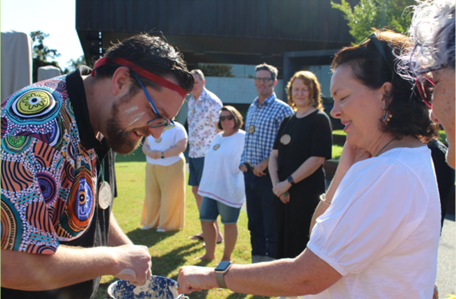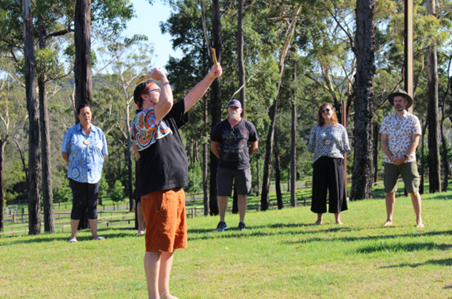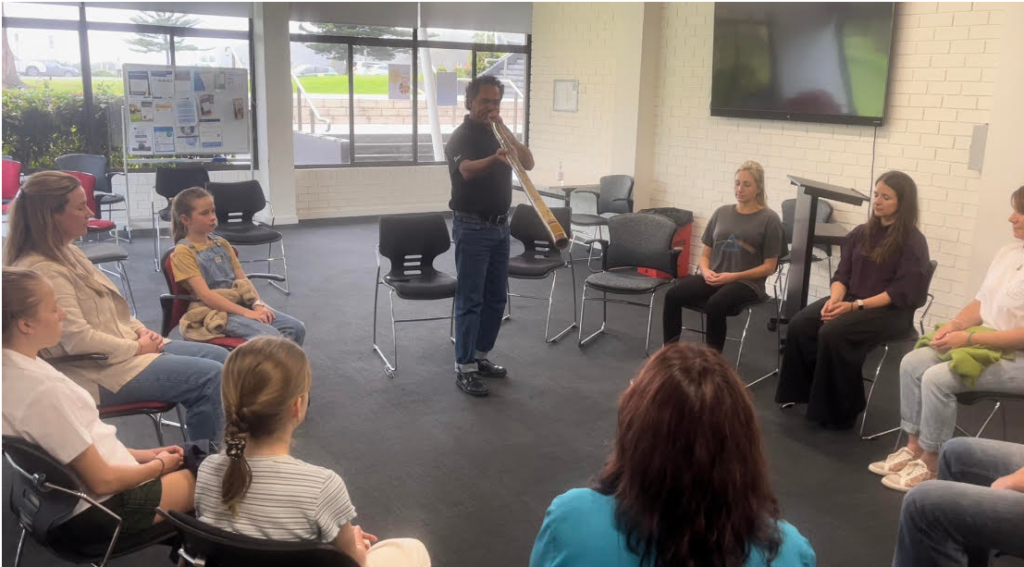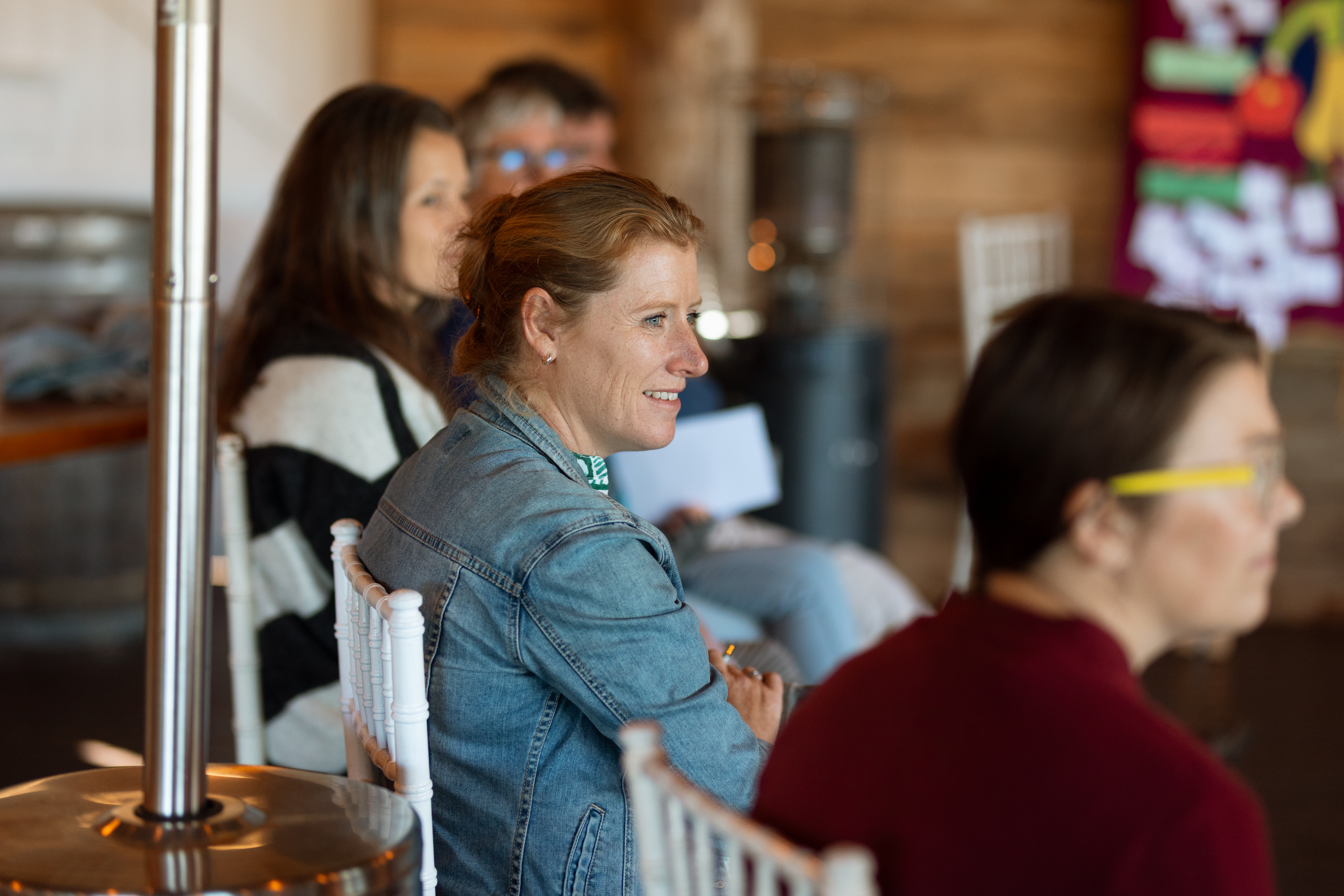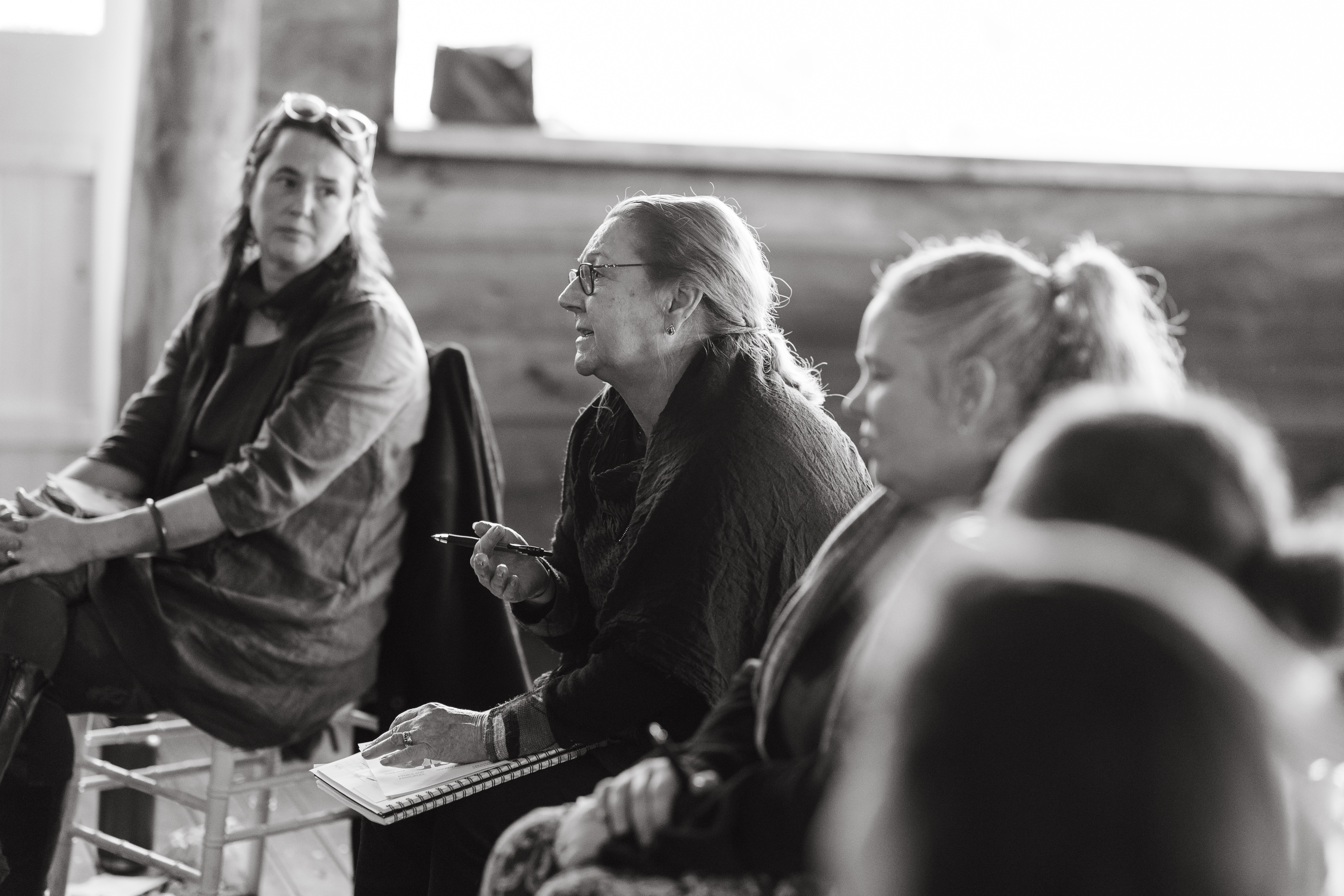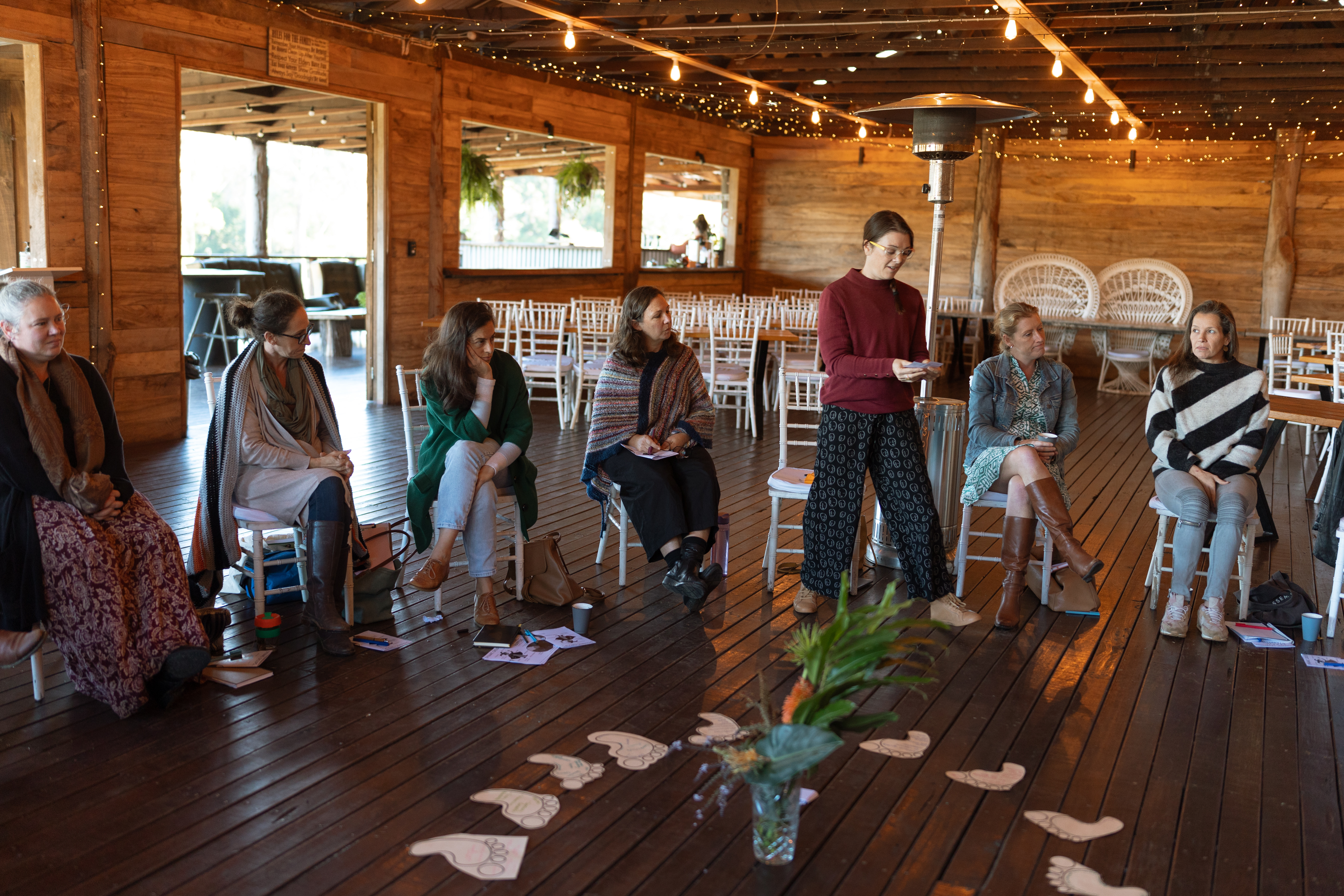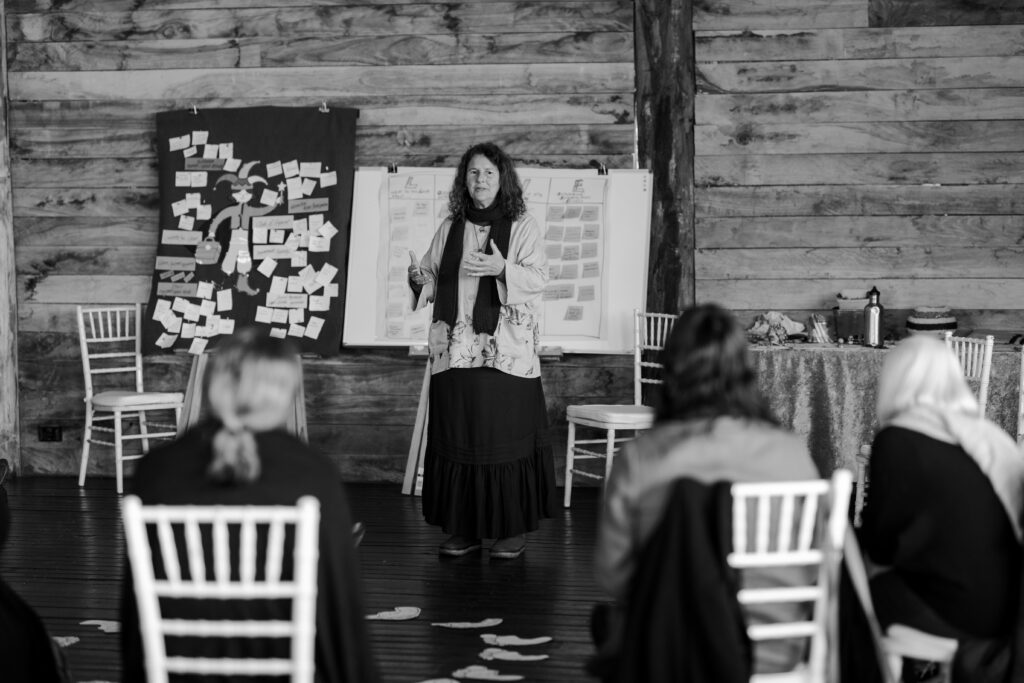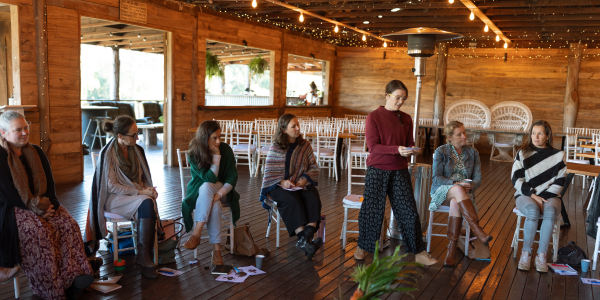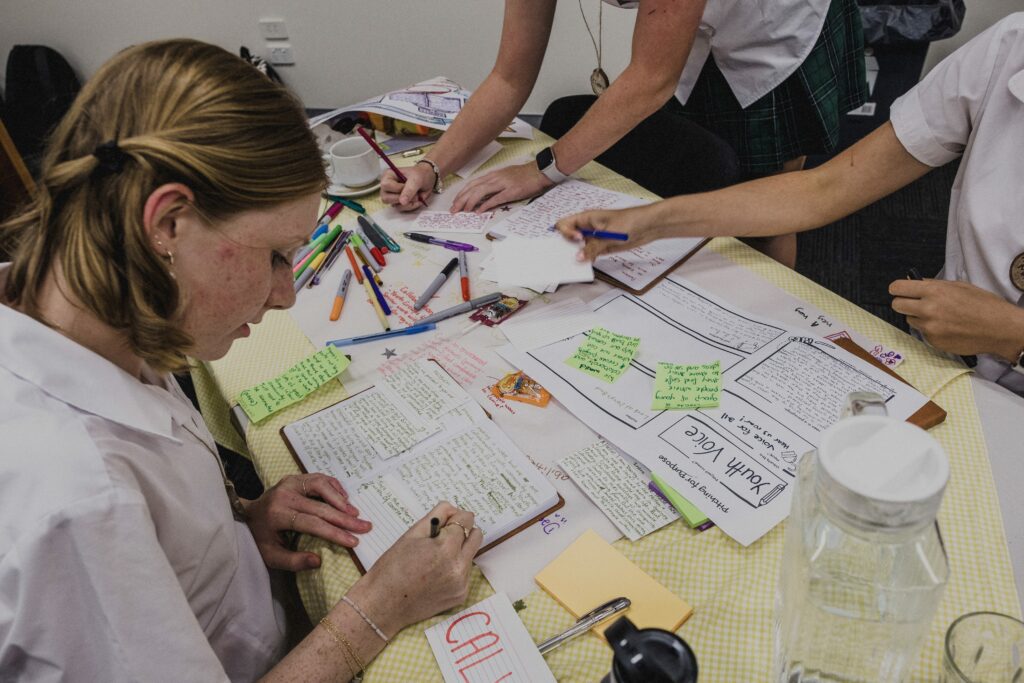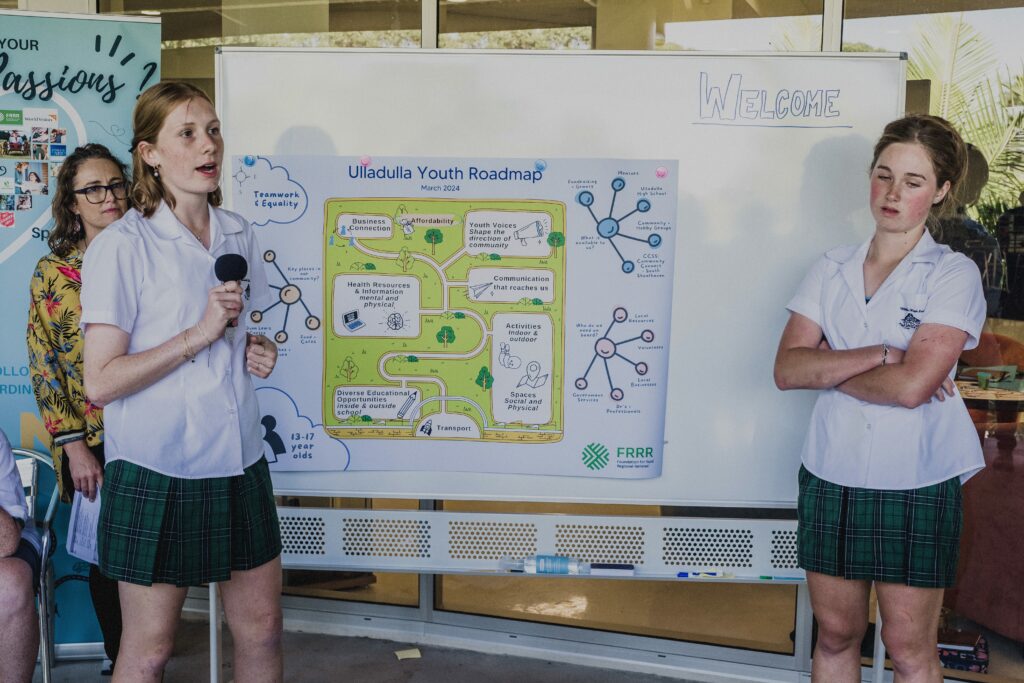Foundation for Rural & Regional Renewal (FRRR)
This article is a personal reflection from our IRCF Program Facilitator in Ulladulla, Monique.
Over the past five years, the IRCF program has woven a rich tapestry of community growth and cultural understanding through an array of touchpoints, workshops, group discussions, events and training sessions. These have allowed community members to network and learn a little bit more about our local Indigenous culture.
As the Ulladulla Community Facilitator, I’ve had the privilege of participating in numerous Welcome to Country ceremonies, each one deepening my appreciation for our connection to this beautiful land and its traditional custodians. I have also enjoyed hearing many community members personalising their Acknowledgements of Country and learning about their connection to this beautiful Yuin nation.
Some of my memorable experiences with community members include:
- Participating in my first smoking ceremony to officially open the High School Sanctuary;
- Witnessing artist Nicole Smede sing in the Dhurga language where her beautiful voice resonated with the spirit of our culture, reminding us of the importance of preserving endangered languages as well as endangered species;
- Didgeridoo meditation with Matt King;
- Standing barefoot, with my hand being painted in ochre;
- Listening to Elders speak about the endangered Black Cockatoo;
- The moving sounds of clapsticks; and
- The graceful dances and storytelling that provided deep insights into Indigenous traditions.
I have also enjoyed sitting in circle with the Ulladulla Yarning Mob to explore how we can help them connect to cultural practices, as well as discussing with local groups how they can learn more about culture and support our local Indigenous service providers.
Throughout our road mapping, workshops, and discussions, we embraced the ancient practice of ‘Sitting in Circle.’ This method, rooted in Indigenous cultural ways, ensures everyone has an equal seat at the table, fostering safe spaces for discussion and allowing for the sharing of passions and perspectives. One local resident, Webby from Lake Conjola, commented that this inclusive hosting method made him feel ‘safe and heard’ and encouraged him to explore various community activities.
Sitting in Circle has also empowered our community to bravely tackle important and difficult conversations. We’ve explored collective needs over individual priorities. Exploring ways to support local Indigenous and other minority groups through our community vision and principles, conversations, offers of support and actions.
I am grateful for the opportunities the IRCF program has provided, allowing myself and many community members to continue our lifelong journey of learning about Indigenous culture. My heartfelt thanks go to the local Indigenous community members who have generously answered our questions, supported and inspired our learning.
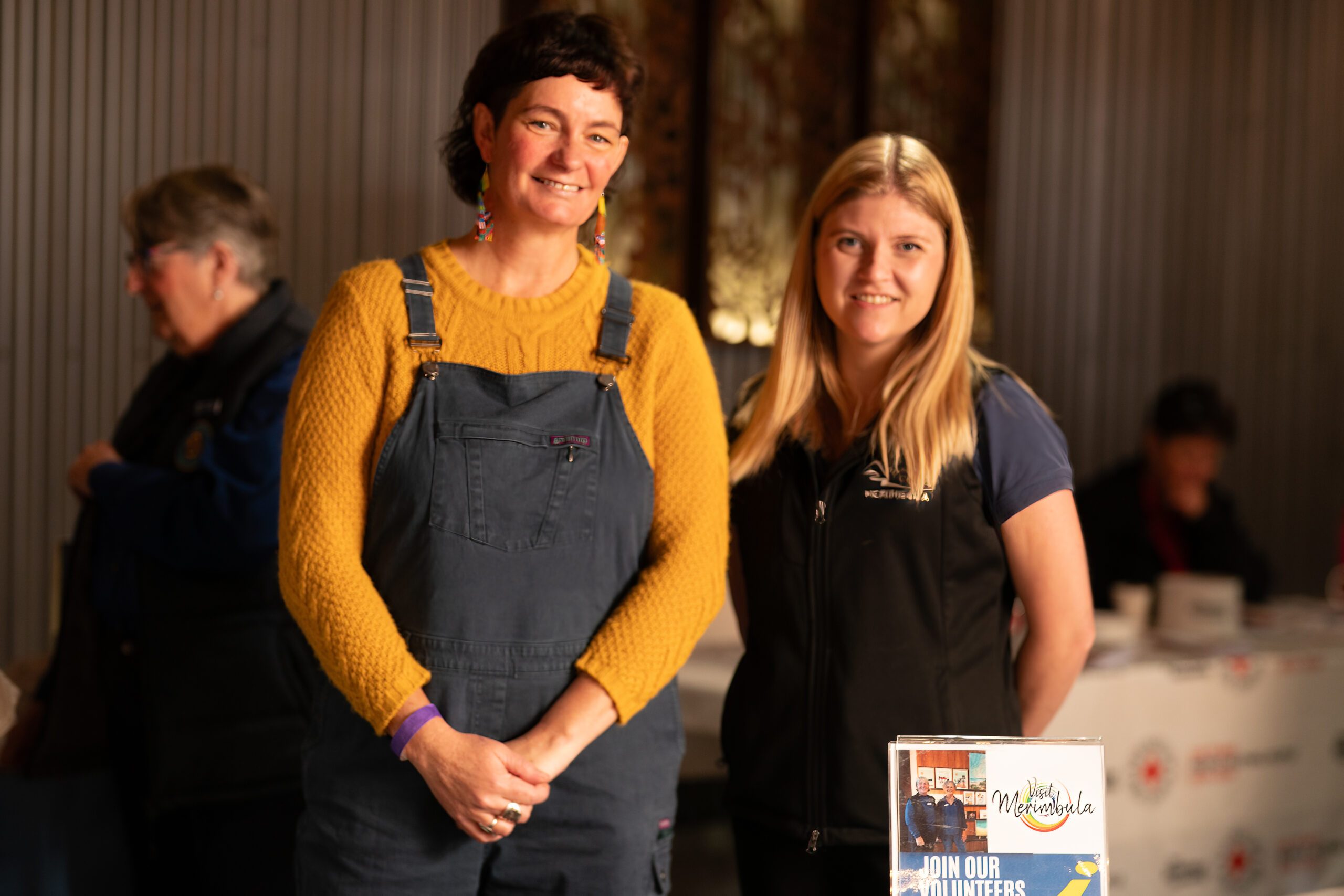
Following Black Summer, the Women’s Resource Centre (WRC) identified the need for more volunteers around women’s issues in Bega Valley. So, they decided to create a role for a Volunteer Program and Activities Coordination Project Worker.
Among the responsibilities of the role were:
- Revising induction processes and forms;
- Maintaining regular communication with volunteers;
- Ongoing support and supervision of volunteers;
- Developing rosters;
- Designing recruitment and workshop flyers;
- Liaising with workshop facilitators; and
- Liaising with other community organisations about volunteer opportunities.
Jade Simpson was recruited into the paid role, working 21 hours a week, supported through FRRR’s IRCF program. Bringing a wealth of insight on the local community and exceptional interpersonal skills to the role, Jade’s been highly successful in recruiting and retaining volunteers at the WRC. During the project, 21 women volunteered more than 350 hours of time at the Centre, taking on roles such as meet and greet, gardening, organising and tidying the Centre, providing admin support and contributing to the Southern Women’s Group historical research project. Jade has also been instrumental in the facilitation of more than 17 workshops. Several volunteers have now become regular weekly contributors, while others have since transitioned to work opportunities.
Jade says that a key element of success has been training, both for herself and WRC Manager Jane Hughes, in addition to the volunteers. Topics included grant writing; suicide prevention; digital mentoring; volunteer recruitment and retention; and domestic violence awareness.
According to Jade, the key to success however was having a clear plan for engagement and sharing the outcomes from the increased volunteering. This included speaking with local media to promote volunteering and at events such as Mental Health Week, the National volunteer Week Celebration, the ‘Many Hands’ Volunteer Expo and to Bega Valley Shire Council.
Having this role allowed Jane to focus on efficiently running the busy Centre in her own limited work hours and to be more readily available to the women accessing the service. The impact of the role has been so significant that WRC has been successful in obtaining further funding to maintain the role for a greater length of time.
“Jade has been incredible, the project has significantly increased volunteer engagement at the WRC. Her hard work has made it possible for us to provide essential training opportunities, to facilitate stronger community engagement and crucially, to work towards securing the continuity of the volunteer coordinator role through various grant applications,” Jane told us.
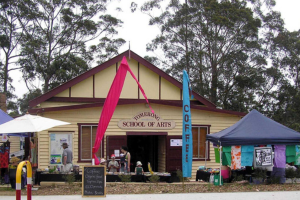
There are often significant and unexpected benefits when NFPs are given support to build their networks and develop strong and effective systems.
A case in point is the Tomerong School of Arts (TSA) in NSW. It manages the Tomerong Hall, which has been a community owned and managed facility since 1926. But they noticed lingering impacts from COVID, including social isolation. When the area lost access to local media outlets, and with internet access in the area poor, it was difficult to let locals to know about opportunities to come together.
Through the IRCF program, TSA sought funding to enhance communication within the community. They opted for a two-part plan designed to strengthen community networks, develop partnerships between NFPs and businesses, and generally foster social capital.
The first project was to create a Welcome Guide for people new to the area, containing information about other NFP’s in the area, available resources, activities at the Hall and the monthly markets. The second was the development and distribution of four newsletters, called the “Tomerong Trumpet”.
The publications were all developed locally, with input from an editor and local artists and published by a local printer. A variety of contributions were also made by local services, people and NFPs. Editorials in the newsletter included information on community fundraising activities and social events, community services and newly established businesses such as Dave’s Coffee Van, based at Tomerong Hall.
With people not having individual mailboxes in the area, distribution was facilitated by several businesses and community services, including Tomerong Post Office, the Tomerong markets and the School of Arts themselves. Digital copies were also made available through social media.
This new way of communicating yielded multiple benefits, including an opportunity for community members to learn journalism, website development and communication skills. In fact, the quality of the Welcome Guide and newsletters was so high that the Editor was approached by various local businesses for advertising. The resulting revenue was used to print beautiful, glossy covers for the publications.
The impact of this project cannot be understated. There has been a 56% increase in the number of stall holders at the Tomerong markets and a 48% increase in market attendees. There has also been an increase in the quantity and diversity of activities at Tomerong School of Arts, with the hall being hired for Yoga, Tai Chi, NDIS groups, weddings, memorials, events during Harmony Week, by the LGBTGIA+ community and various dance groups.
The Hall has become a hub of activity and a source of wellbeing and information for everyone in the community and they were even required to expand their management committee with two additional members.
Perhaps most important of all though, the communication activities have had wonderful ripple effects, including introducing local residents to each other & consolidating a wonderful sense of community. A great example of how this organisation delivered on their goals to better connect with people in their local area and help them become more responsive to community needs and aspirations.
Through IRCF, we saw that organisations that had capability in forming and nurturing partnerships and could engage with multiple community perspectives experienced a greater impact from being involved in the program. This reinforces that strong collaboration is built from experience, different skills and approaches. This was explored recently in more depth at a workshop in the Nambucca Valley.
Bowraville Social Enterprise Precinct (BISEP) has held a series of activities to equip themselves with resources to support the Nambucca Valley community moving forward. Recently, Robin Clayfield shared her expertise in supporting organisations and grassroots community groups to work together effectively for positive change at a session called Dynamic Groups and Sociocracy.
The workshop offered interactive ways for groups to develop a strong sense of culture and clear strategy that is inclusive of multiple perspectives. Robin ensured the group was aware of the facilitation techniques she was using so that they had the ability to use the new skills immediately. She also offered the group an introduction into Sociocracy and the opportunity to practice the process, an interesting methodology that enables diverse groups to work together on a shared purpose, while maintaining autonomy.
The group that gathered included old and new faces, which confirmed that community engagement efforts are paying off. The digital system and communications platform also initiated through IRCF and managed by the organisation, The Valley Hub, is an ongoing form of engagement and is amplifying efforts to connect the community. We’d love to hear how your organisation is harnessing systems to engage local NFPs and residents and ultimately create a stronger community.
Roadmap workshops have been an important part of the IRCF program in each community. Each year in each of the eight participating communities, a diverse group of people from across the community sector comes together to harness each other’s knowledge and together map out what will make the greatest difference in their community.
The competitive nature of many funding and granting programs can hinder collaboration between not-for-profits. The annual IRCF roadmapping process is a space for the community to ‘un-learn’ competition and build enhanced local partnerships and relationships.
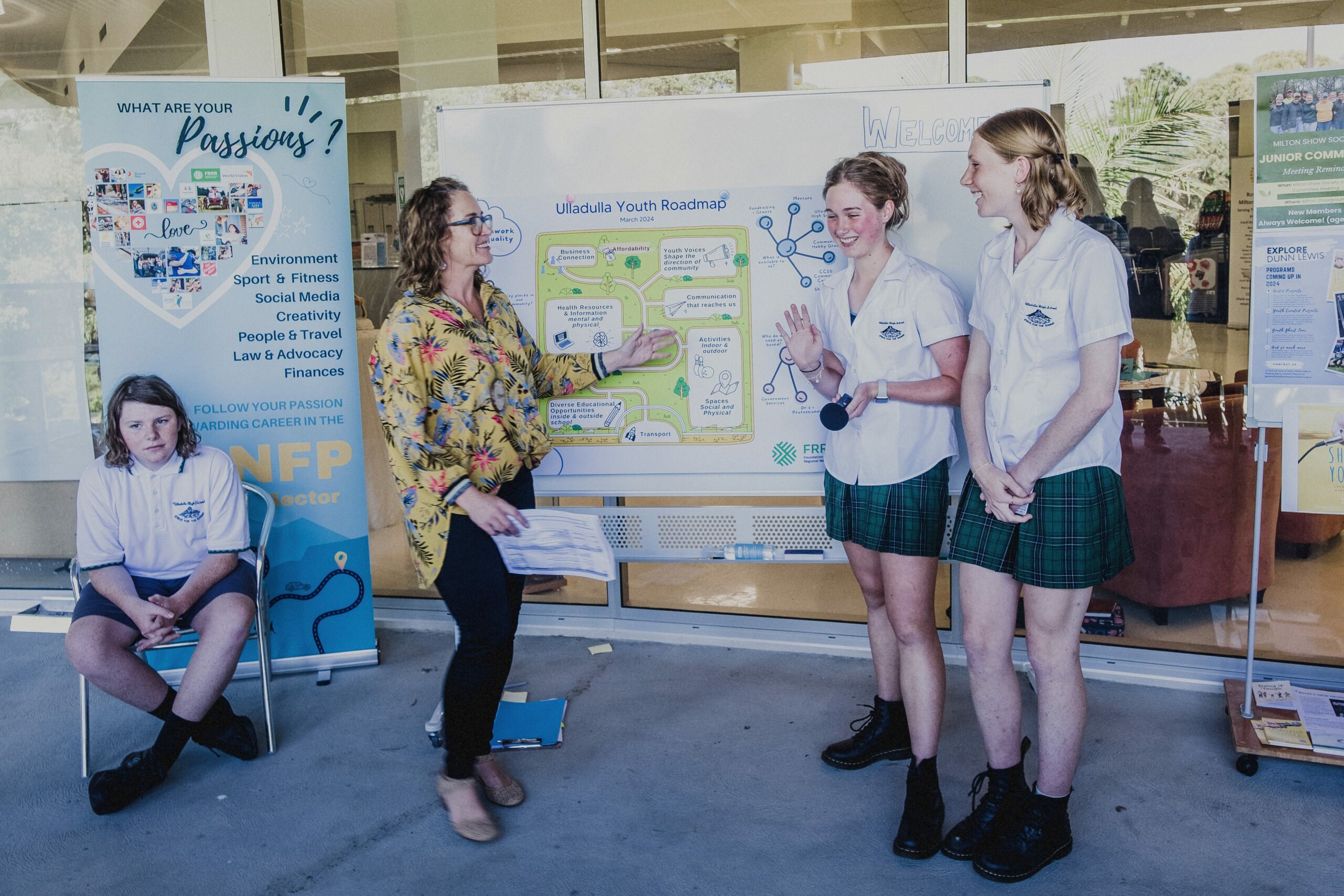
One South Coast participant reflected that, “Roadmapping was brilliant. We had a big demographic of people, and it made everything very concise and clear.”
Each roadmap developed is a unique reflection of the priorities of each IRCF community, with a few recurring themes. One of those recurring themes is engaging young people as the next generation of leadership for communities and the not-for-profit sector. This was tackled head on when young people from Ulladulla High School came together in March to develop a roadmap of their own.
The result: a ‘Youth Roadmap’ for the community with some brilliant ideas for how young people can work alongside existing community organisations, events and infrastructure to enhance them and get the next generation more involved. There is now a movement for change building in partnership with local backbone organisation, the Dunn Lewis Centre.
So why is developing a roadmap so important? They create a shared vision that can act as a map for how the community – and young people – can move forward together with greater connection and a shared vision and common goals for a thriving future.
The IRCF program is designed with roadmapping, community facilitators and capacity building at its core. In the NSW South Coast, the program is culminating in 2024, so the team took the opportunity to codesign four final roadmapping workshops using techniques learned at the Art of Hosting workshop.
A strong learning from the IRCF program around how to connect with busy volunteers who juggle many balls and wear many hats, is the art of invitation. For these workshops our invitation was ‘Lets celebrate our collective effort & explore how to continue the momentum in our community’.

These workshops embraced the opportunity for the groups to review the roadmaps, explore what else may be done, and of course to network. We took a supportive approach to enable the groups to delve into collaborative projects that will benefit the entire community – which will be the focus of the remaining funds generously provided by the Snow Foundation and Bendigo Bank Community Enterprise foundation in the communities.
Attendance at the workshops was strong, with FRRRhosting 55 people. When everyone had gathered, we opened with a check in question at each location: “Can you tell us about a benefit you have personally felt or gained from the IRCF program?”
The sharing that came from this considered question was much richer than any survey could have gathered. Carolyn Ardler, South Coast Program Manager for IRCF, said, “Using Art of Hosting techniques to delve into deeper conversations has been such a strength of the program.”
The groups shared that they now felt more connected to and aware of the NFP community. They have formed stronger relationships within this community and they can now see who is doing what and who has similar needs and common struggles. Not only that but they had formed friendships. The sharing of the skills they had gained was outstanding, with some sharing their growth following opportunities such as the Art of Hosting Conversations that Matter, Regenerate residential program and the Changemakers program, all of which focussed on leadership skill building and connection.
Other learnings were the wide range of capacity building workshops and opportunities throughout the four years. The joy of getting to know people and learn so much from one another without following a cookie cutter approach was one of the biggest benefits of the place based program.
On more than one occasion, people shared that this was the “first time they had popped their head up to see what else was happening.” One Rotarian who has been involved since the beginning of the program said that, “It gave Rotary an opportunity to look at our organisation differently, as well as the opportunity to work with and support other organisations.” A lovely comment was made by a volunteer that it provided “camaraderie – that we all are striving to improve our society.”
The IRCF roadmaps all identified that the NFP sector has a desire to connect with cultural services and better understand the competency journey that comes when connecting more deeply to local first nations culture and people. A participant shared that she has now “a deeper appreciation of indigenous culture.”
The exploration of where we can build on this momentum was different in each community with some groups emerging focused on how community can collectively address important national issues such as homelessness, regional transport and deeper first nations connections, whilst other groups are building alliances across the sector to advocate for funding. The emergence of backbone organisations that support the sector is a strong theme, with one organisation already embedded deeply after four years and wanting to establish more processes and networks to support the volunteers in community.
The workshops were a wonderful opportunity to celebrate the ripple effects that the program has had and to enable us to capture the importance of networking. It provided a space for openness and generosity of the people in the room to shine – creating the opportunity to renew connection and trust in the communities.
Recently our IRCF Program Manager, Nancy Sposato, along with representatives from Junee Community Centre, Junee Community Power and Junee Shire Council spent three joyful days learning about The Art of Hosting at a workshop led by Percolab (formerly Campfire Coop) in Bright, VIC.
They came together with 40 community leaders from across the country. Each leader brought a passion for nurturing community conversations and a desire to do it better.
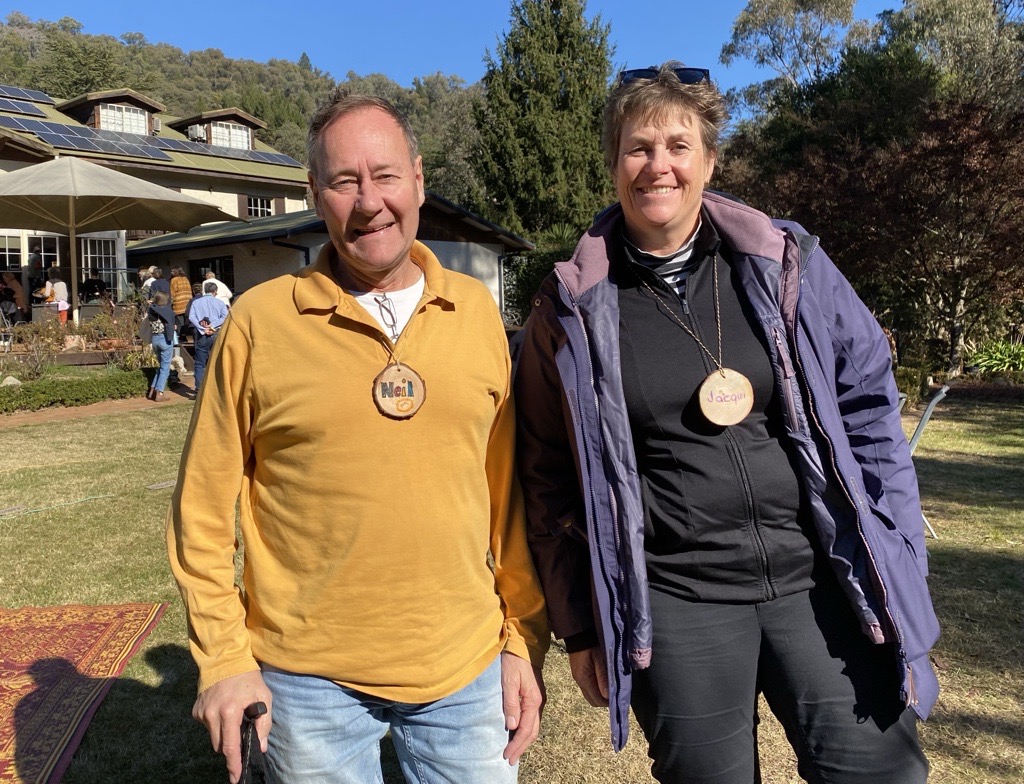
For Junee members, this participation was supported by an IRCF Toolbox grant with local leaders intending to apply skills gained towards developing effective and meaningful ways to foster inclusive community engagement and to have a shared language to be able to support each other in their efforts well into the future. The Junee initiatives that will directly benefit from this investment in people include a project that engages young people in the NFP sector, the development of culturally safe services and uptake in the renewable energy transition.
Nancy reflected, “A question that comes up time and time again is how to manage conflict and differing perspectives in a community. This is a very natural question when people are working on projects that they care strongly about and when people have invested a lot of time and energy.”
The skills gained over the three days offered efficient methods and insights into the awareness we need to have as individuals and the ways people can work together to foster positive cultures where everyone participating feels supported and included. Participants of the workshop spoke about using some of the tools they had learned immediately in work and during meetings.
Nancy and the rest of the community leaders, left with multiple techniques for having important conversations that can be applied to multiple contexts, frameworks to use for collaborative project design and creative ways to collate and share information gathered from community conversations to support greater impact and momentum.
You can check out a foundational Art of Hosting technique, the Four-Fold practice, at the link below.
Learn About The Four-Fold Practice
Four Victorian philanthropic organisations have joined forces in an exciting $5 million partnership with the Foundation for Rural & Regional Renewal (FRRR) that will strengthen the capacity and resilience of communities over the next five years.
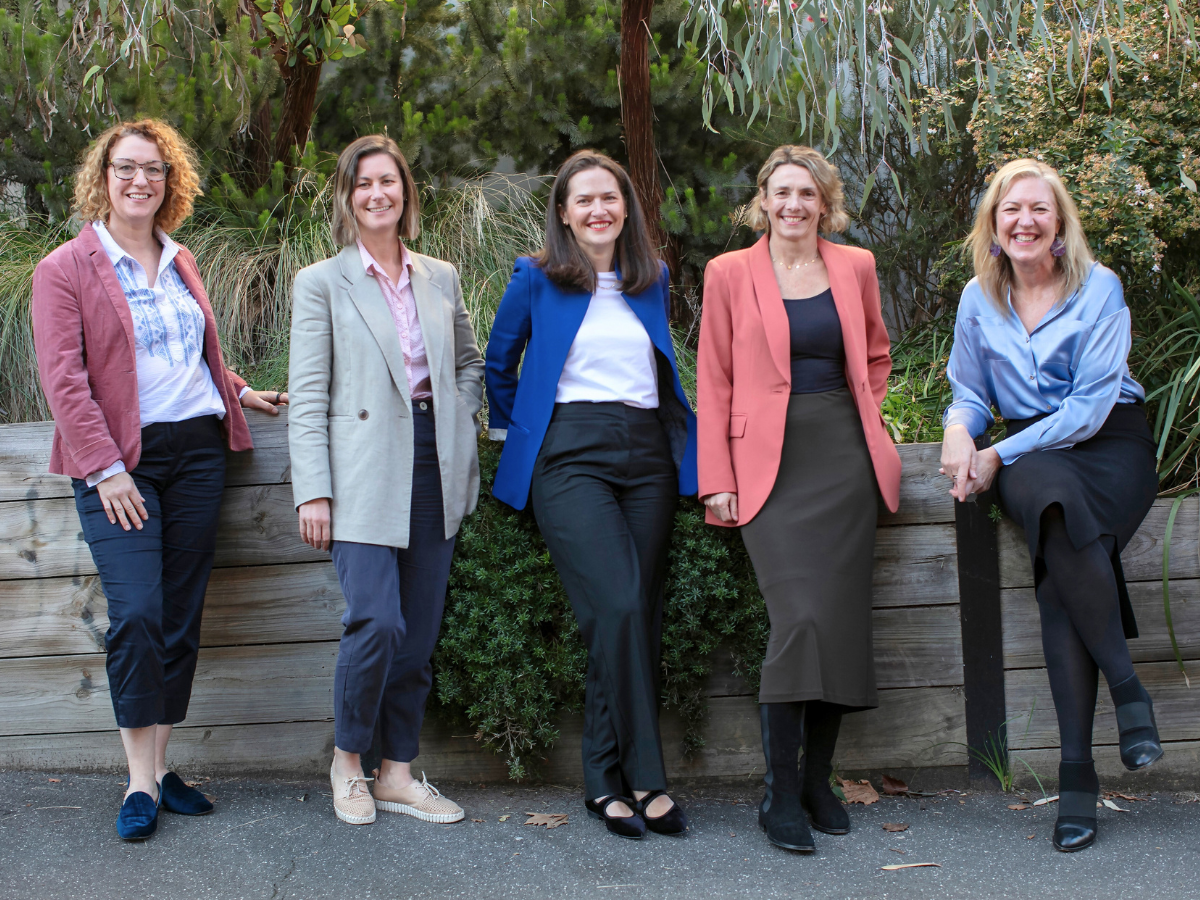
Three Victorian communities will be named later this year, following a detailed process involving needs analysis, mapping key issues, causes of disruption and the funding landscape, and an exploration of community readiness for the investment.
The partnership comprises the Helen Macpherson Smith Trust, the Jack Brockhoff Foundation, The Ross Trust, and William Buckland Foundation. FRRR will deliver the program, following the success of its similar Investing in Rural Communities Futures program (IRCF) in NSW over the past five years.
The funding will enable local not-for-profits (NFPs) to become more confident and collaborative in their approach to improving and sustaining the vibrancy, resilience, and liveability of their communities, ultimately enabling them to thrive, not just survive, especially during times of natural disasters.
“Investing in and strengthening the social and economic fabric of Victorian rural communities fosters long-term resilience,” says the CEO of FRRR, Natalie Egleton. “We know that our model can deliver these outcomes, and the multi-year model builds a whole-of-community approach.”
The $5 million funding will be used to employ local facilitators, deliver capacity building activities for the local NFPs such as governance training, volunteer development, marketing and fundraising support, and events. Funds will also be allocated to the three communities via grants for priorities and for organisational capacity building. Evaluation is central to the program.
The NSW program
The NSW program started in 2018 after FRRR recognised that many grassroots organisations were ‘locked out’ of philanthropy and often unable to access opportunities to invest in their own organisational capacity due to their size, distance, financial capacity, and lack of staffing.
“Most of the NFP work that happens in small towns is volunteer run and there just isn’t any money or resources to help them be sustainable,” Natalie said. “Local leaders know what is going to make the biggest difference in their community and we knew that supporting local solutions would be key.”
The program commenced in Junee, Leeton, and Nambucca Valley with the support of Vincent Fairfax Family Foundation. The Snow Foundation and Bendigo Bank then joined to enable FRRR to take the program to Ulladulla, Batemans Bay, Nowra, and Bay & Basin. The Australian Government provided additional funding to expand the program in the Shoalhaven region and launch the program in Bega through their Black Summer Bushfire Recovery Program.
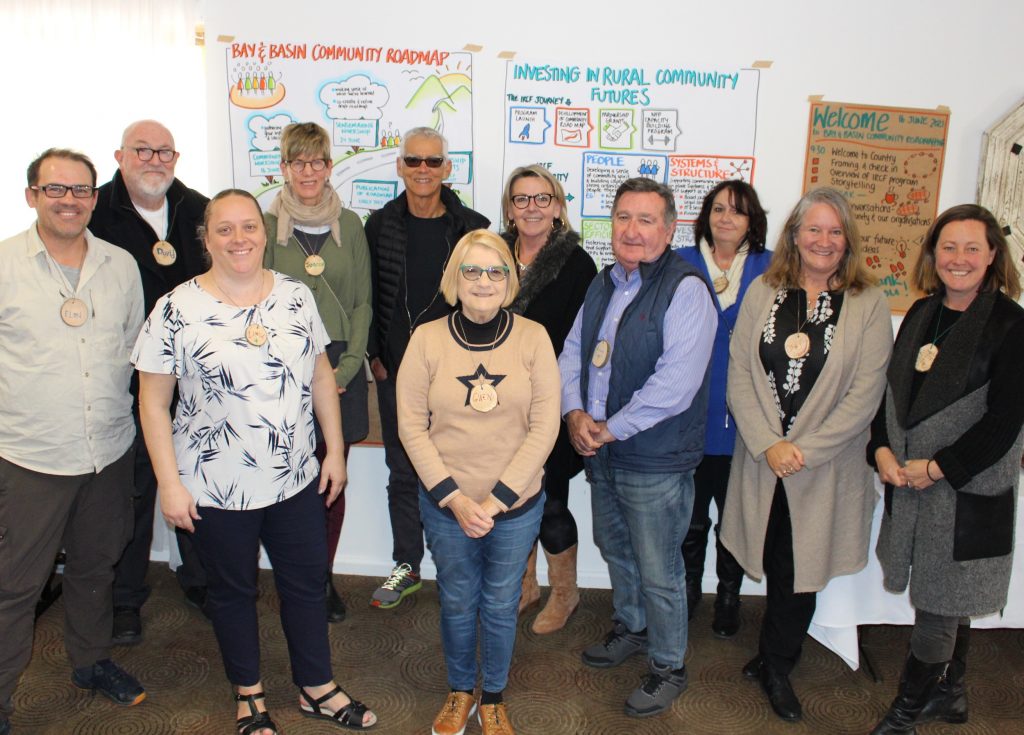
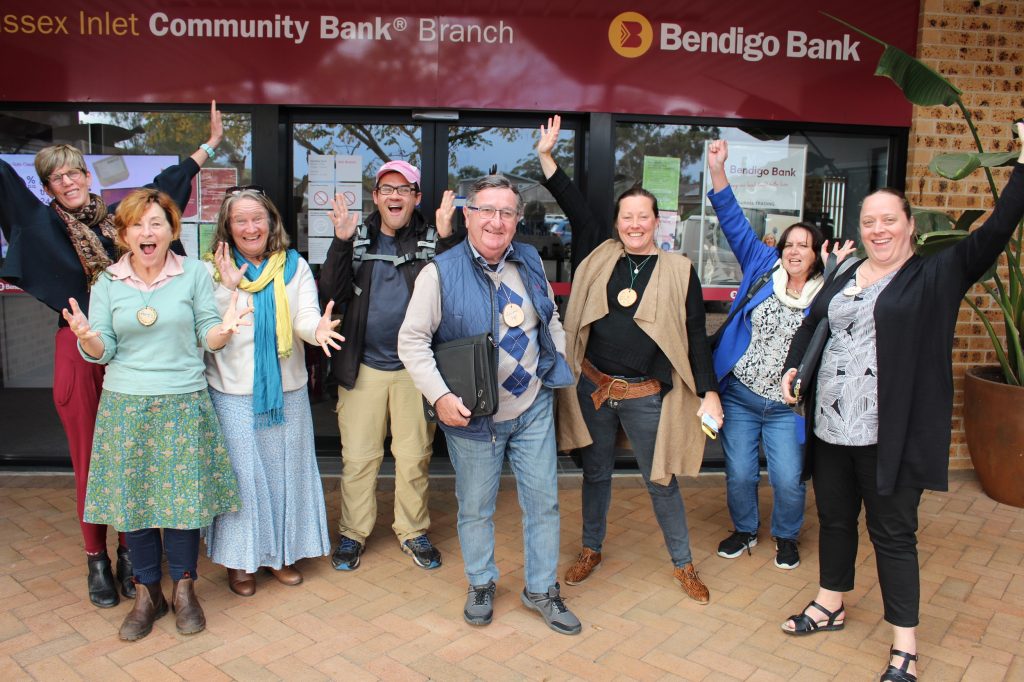
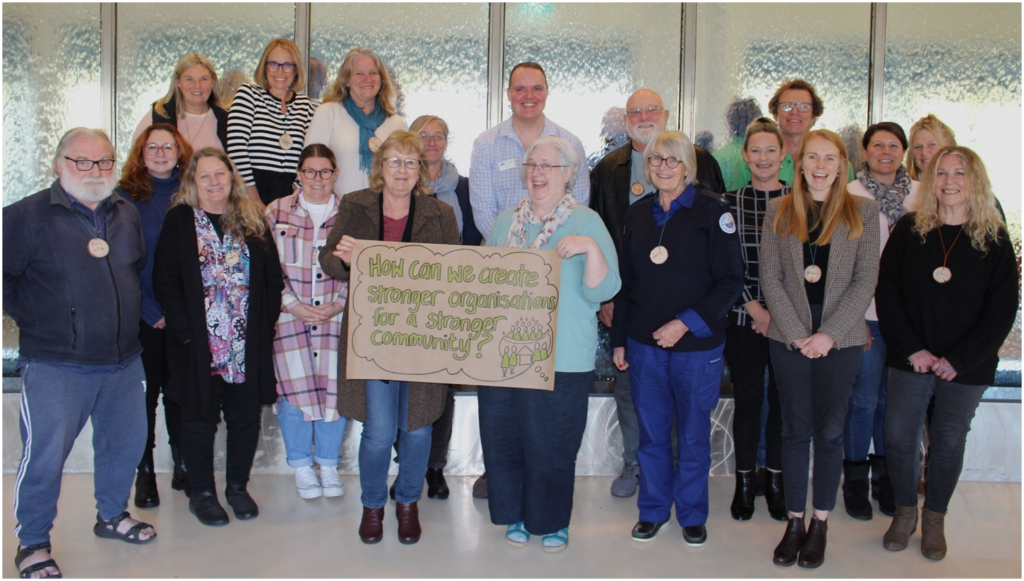
Evolution of the Victorian partnership
The plan to bring a similar program to Victoria began in late 2022 after The Ross Trust began discussions with FRRR and the Helen Macpherson Smith Trust. Conversations then began with the Jack Brockhoff Foundation and William Buckland Foundation. Importantly, the leaders in all these organisations had strong existing relationships and numerous granting collaborations with each other, as well as with FRRR.
“I could see that this program was about building the skills, resources and capacity of local not-for-profits – and that it was working,” said Sarah Hardy, the CEO of The Ross Trust. “It was also clear that any Victorian partnership would need a commitment of $5 million to get off the ground. That is a lot of money for any one mid-sized philanthropic, when we all have ongoing projects.”
Sarah said the positive and trusting relationships between the five organisations meant they were able to openly discuss whether it was a project that their trustees and directors would support.
The CEO at the Helen Macpherson Smith Trust, Debra Morgan, said the early conversations and resulting partnership benefited from like-minded organisations working together.
“We realised early that we couldn’t do anything this significant alone, and that working together would help us to affect better and longer-term change,” Debra said. “This collaboration sets a new bar in how we work together, and it’s certainly the longest-term project we have funded under our new strategy.”
Louise Kuramoto, the CEO of the Jack Brockhoff Foundation, said that it was the first time, other than a commemorative grant, the foundation had made a five-year commitment to a project.
“The philosophy behind this program is not unusual, but the amount and duration are,” Louise said. “The solid track record of FRRR gave all four funders the confidence to invest at such a scale. It’s wonderful that we can come together to support communities and the people in them.”
For the Grants Lead of William Buckland Foundation, Ferdi Hepworth, the program perfectly aligns with her organisation’s long commitment to country Victorians.
“We have had a long partnership with FRRR and more recently we’ve been funding a program where FRRR distributes small grants to communities, and we had already been talking about how we could better support them,” Ferdi said. “It was very easy to say yes to being part of this partnership.
“We often see governments and big business leading change, but it’s the people in the community who best know the ingredients required to help that community thrive. This project supports those people with the skills, knowledge, and confidence to work together to achieve change.”
After many emails, online and in-person meetings, visits to NSW communities, and discussions with their trustees and directors, the four funders set themselves a deadline of June this year to see if they could raise the $5 million to commence the program in July 2025. By April, they had done it.
“For four mid-sized philanthropic organisations to raise $5 million when we already have current commitments shocked us all, but in a good way,” Sarah said.
How the program will work in Victoria
FRRR will study past granting trends and community profiles and will map issues and disruptions occurring or on the horizon, as well as the funding landscape, to select the three communities. The process will also include community consultation, with a shortlisting process that will invite expressions of interest. Given the program is grounded in deep collaboration and co-design with each community, it is vital that there is a sense of readiness to embark on the five-year partnership.
Once communities are selected, a locally based community facilitator will work with the local NFP sector to scope priorities, gaps and opportunities that will be collated into a sector roadmap. The roadmap, which will be refreshed annually, will be the framework for activating capacity building activities and funding, and for monitoring progress, celebrating change, and adjusting priorities as needed.
Natalie from FRRR said she was confident many Victorian communities would be enthusiastic about the opportunity, adding that, like in NSW, it was likely the communities would be at very different starting points.
“Success is turning out to be different in each community, which is fine because the indicators we are interested in all focus on changes in mindset and sector collaboration to drive new and better opportunities for their communities – and that has been a major success,” Natalie said.
FRRR will employ a program manager who lives in Victoria and is familiar with key concerns and issues in the state. Local facilitators will also be employed in each community. Over time, it is expected that more than 20 people will be employed in the program. Staff and volunteers will benefit from training and professional development and possibly partnerships with councils, TAFEs and universities.
Deb Samuels is the People Portfolio Lead at FRRR and will oversee the Victorian project.
“We now have five years of NSW evaluation data and interviews and the recurring theme is that people in the communities feel much more empowered to make decisions and collaborate,” Deb said. “If they know a large grant opportunity is coming up, they know who to call to say, ‘let’s pool our efforts to apply’.”
Deb cited examples of success that could be replicated in Victoria, such as one NFP leader rallying to halt the closure of a local bank branch that was relied upon by vulnerable residents, and another leader now running for mayor.
“Local leaders involved in the IRCF program have shared they would not have had the confidence to do things like that in the past,” Deb said. Young people can also engage with the program and see themselves as an important part of the NFP sector.
“One of the best things somebody said to me is that ‘the funders believed in us and invested in us, and now we believe in ourselves and what we can do’.”
Not-for-profit organisations (NFPs) across the South Coast are sharing more than $360,000 across 27 projects that will strengthen their capacity to support their local communities.
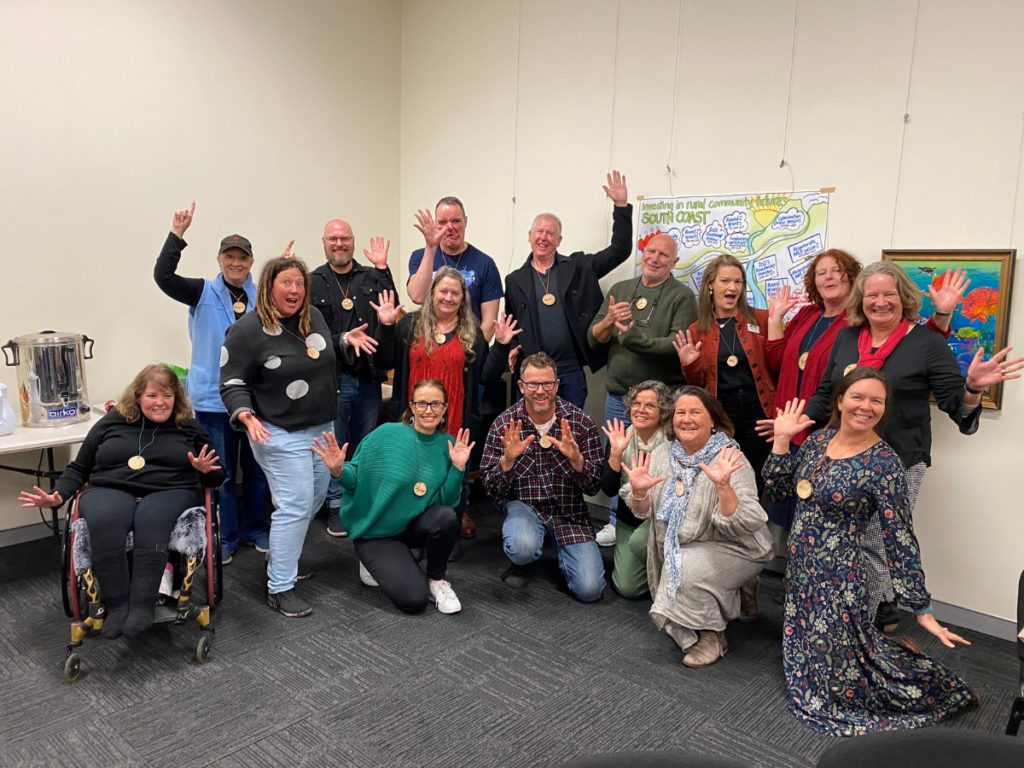
The funding comes through FRRR’s Investing in Rural Community Futures (IRCF) program, in partnership with The Snow Foundation and Community Enterprise Foundation, which has been operating across the South Coast since 2020.
Carolyn Ardler, FRRR’s Program Manager for the IRCF South Coast program, said that the premise of the IRCF program is to encourage local groups to engage in greater collaboration, skill-building and, where possible, share resources and learnings for the benefit of the whole community.
“The IRCF program is all about helping local groups to be better able to support the communities and causes they were set up to assist. It involves a mix of grants directly to individual NFPs and workshops and training (usually led by a local group on behalf of other NFPs), all supported by a facilitator in each community who works alongside the groups. The program is entirely community driven, starting with a co-designed community roadmap that’s updated regularly, which helps FRRR and our partners prioritise where to direct investment in each community.
“Over the last three years, there’s been significant investment in strategy and planning, and now we’re seeing more projects around efficiencies, systems and processes, alongside continued investment in people and their capacity. As we head toward the culmination phase of the program, we’re also seeing communities establishing the systems and processes to sustain the networks, connections and collaborative ways of working they’ve established in recent years, so that’s exciting,” Ms Ardler said.
The Snow Foundation was the first donor partner to support the program on the South Coast and local resident and Chairman of the Foundation, Terry Snow, said that it’s so rewarding to see the long-term changes that have come about.
“While there’s still a few months until the program formally concludes, it’s been wonderful to see how well the local not-for-profit and community groups have embraced the chance to come together, agree where they could all benefit from upskilling and sharing their experiences, and to then put it into action. There are several organisations that are now much stronger and they are better able to support not only their chosen beneficiaries, but also other not-for-profit organisations. We’re delighted to have been part of this and look forward to seeing these projects that are being announced today also make an impact,” Mr Snow said.
Bay & Basin projects
In the Bay & Basin area, seven projects are sharing $76,749, thanks to the support of Bendigo Bank’s Community Enterprise Foundation. The focus in this round of funding was strongly on youth-aligned organisations and projects. This part of the South Coast is one of the more recent areas to come on board the IRCF journey, so the groups are still building connections and working closely with the local IRCF facilitator.
David Impey, CEO of the Community Enterprise Foundation, said it’s really pleasing to be able to support more projects that will strengthen the future of these local organisations and the region.
“It’s exciting to see a diverse range of projects continuing to come forward from local NFPs. This round, we are pleased to see several that focus on engaging young people, which is great to see as they are critical to ensuring a strong future in these regions. But there are also a number of projects that will enhance the capacity of these organisations, such as better systems and processes, upskilling staff or volunteers and creating assets and resources that can be shared across NFPs. This goes right to the heart of ensuring strong communities and we are delighted to be part of it.”
Nowra projects
Ten projects in and around Nowra are sharing $114,911, thanks to support from The Snow Foundation. This is the final round of grants for Nowra and we’ve seen increased networking activities and discussions about how to collaborate on projects. This tranche of projects has a strong focus on supporting people and developing systems.
Batemans Bay projects
This is also the final round of funding for Batemans Bay and five projects will share $94,946, with support from The Snow Foundation. With these grants there is a focus on creating efficiencies and most projects are collaborative, with more than one organisation benefitting.
Ulladulla projects
Thanks again to The Snow Foundation, five projects are sharing $76,125, most of which focus on enhancing administration systems and procedures to improve capacity and better support the community.
The full list of grant recipients and their projects are below.
| Organisation | Project | Location | Grant | |||
|---|---|---|---|---|---|---|
| BATEMANS BAY | ||||||
| Anglican Diocese of Canberra and Goulburn Parish of Moruya | Moruya Commons Community Hub - Fostering Participatory Culture Foster collaboration, reducing duplication and strengthening networks across the not-for-profit sector by providing IT equipment and governance for a shared office space. | Moruya | $20,546 | |||
| Arts Council of Eurobodalla Inc | SASI - Shared Administrative Systems Implementation Ease volunteer working conditions through employing a co-ordinator to develop procedures and policy manuals for three organisations - Arts Council, River of Art Festival and Sustainable Agriculture Eurobodalla (SAGE). | Moruya | $30,000 | |||
| Southcoast Health and Sustainability Alliance | Governance In Action - Enhancing Sustainability and Collaboration for NFPs Support organisation to proactively tackle climate change, with training for volunteer committee in financial management, governance and administrative systems. | Batemans Bay | $14,400 | |||
| Sustainable Agriculture and Gardening Eurobodalla | Policies, Procedures and Capacity Building for SAGE Volunteers Support development of strong local food systems, offering events and training opportunities for community, by establishing an event management / coordinator position. | Moruya | $10,000 | |||
| The Family Place Inc | Building a Resilient Future: Advancing Sustainable Growth through Fee for Service Expansion Expand access to support services by growing organisation's capabilities, through increased staffing resource to enable CEO to focus on building sustainable OOHC model. | Moruya | $20,000 | |||
| BAY & BASIN | ||||||
| Bay & Basin Community Resources Limited | Work Re-Design to Thrive and Grow Upskilling staff to re-design workflows and tasks to increase the efficiency of a community organisation. | Bay & Basin region | $29,734 | |||
| Changing Tide Wellness Ltd | Community Connect: Empowering Wellness Creating an accessible, inclusive website, so those with disabilities can more easily access information about appropriate services. | Bay & Basin | $5,426 | |||
| Community Champions - SP&SGB Inc | Community Champions - Bay & Basin Community Growth and Empowerment Workshops 2023/24 Encourage collaborative community conversations to explore ways to better support the community across the not-for-profit sector. | St Georges Basin / Sanctuary Point | $4,000 | |||
| Noah's Ark Centre of Shoalhaven Inc | Building Bay & Basin Administration support for a service provider that is focused on children with disabilities and special needs, so they can expand and embed their services. | Sanctuary Point | $7,488 | |||
| Sanctuary Point Community Pride Incorporated | Sanctuary Point Nexus: Fostering Pride and Unity Bolster community engagement and pride in Sanctuary Point by creating a comprehensive visual of community assets. | Sanctuary Point | $5,650 | |||
| Sussex Inlet Foundation for Community Development | Building Youth-focused Services for Sussex Inlet Encourage youth engagement and involvement in the community through the development of a Youth Advisory Group. | Sussex Inlet | $9,500 | |||
| yiliga-miraral Wellbeing Team Vincentia High School P&C Association | walawaani-ngarn Into The Future Measuring the impact of a program that provides wellbeing support to students and families to help attract additional funding, so it can continue. | Vincentia | $14,951 | |||
| NOWRA | ||||||
| Beyond Empathy Limited | BE Studios Capacity Building Project Strengthen organisational capacity in Nowra and the Shoalhaven region by engaging someone to develop a business plan, marketing strategy and promotional materials to support employment pathways for young artists. | Nowra | $14,144 | |||
| Kangaroo Valley Voice Incorporated | Kangaroo Valley Voice Capacity Building and Longevity Project Enhance organisational capacity and sustainability by employing part-time staff and developing a website for The Kangaroo Valley Voice newspaper to better connect the community. | Kangaroo Valley | $20,000 | |||
| Noah's Ark Centre of Shoalhaven Inc | Our Workforce - A New Way Boost organisational capacity by creating a tool to help a children and family service provider transition to flexible working. | Nowra | $9,400 | |||
| Nowra Community Food Store Incorporated | HR Plan Implementation Strengthening operations by providing training and capacity building for staff and volunteers at a low-cost grocery store, which is run as a social enterprise. | South Nowra | $7,377 | |||
| Nowra Local Aboriginal Land Council | Strong Board Foundations Strengthening operations through training in IT, cyber-security and financial record keeping for staff and Board members to support their transition to digital record-keeping. | Bomaderry | $9,500 | |||
| Shoalhaven Business Chamber Incorporated | Resource Hub Shoalhaven Upgrading a website to create a central hub for policies, procedures and tools for members. | Nowra, North Nowra, Bomaderry, West Nowra | $11,490 | |||
| Shoalhaven Neighbourhood Services Inc | Creating Efficiencies: Streamlining Policies and Procedures Creating efficiencies by streamlining processes, policies and practices to comply with current regulations. | Nowra | $10,000 | |||
| Shoalhaven Womens Resource Group Ltd | Strategic Aim 2 - Successful and Sustainable Operation of ROCC Build organisational stability by engaging a HR consultant to review HR and WHS policies, as well as conduct team building and wellbeing activities to strengthen an organisation’s culture. | Nowra | $15,000 | |||
| South Coast Beef Producers Association Incorporated | Upgrading the South Coast Beef Website Upgrading a website to handle financial transactions such as invoices and taking payments, thereby streamlining processes and freeing up staff. | Nowra | $3,000 | |||
| Waminda South Coast Women's Health and Wellbeing Aboriginal Corporation | Blak Cede Social Enterprises - Pathways to Cultural Employment | Terara | $15,000 | |||
| ULLADULLA | ||||||
| Growing Together South Coast Incorporated | Growing Stronger Together Support skills development with training in market gardening and first aid, developing an e-commerce platform and sourcing funding streams for new NFP growth. | Milton | $14,900 | |||
| Safe Waters Community Care Inc | ASES Accreditation for Financially Sustainable Homeless Services in Ulladulla Build expansion of homelessness service, allowing access to longer term government funding with formal Australian Service Excellence Standards (ASES) accreditation and policies and procedures update. | Ulladulla | $16,565 | |||
| South Coast Bookclubs Incorporated | Growth of Services Foster literacy, social connections and engagement by collaborating with three organisations, pooling resources, and providing local book access. | Ulladulla | $7,200 | |||
| StoryFest Incorporated | StoryFest Sustainable Schools Program Encourage youth to develop a love of reading and writing, by building an ongoing sustainable financial model to host the Annual Literacy Festival for school students. | Milton | $15,000 | |||
| The Dunn & Lewis Youth Development Foundation Limited | Connected Space Develop youth employability / life skills via inspiring stories / achievements, through creating a communication strategy and building a website. | Ulladulla | $22,460 | |||
By Deb Samuels, People Portfolio Lead
With the rates of volunteering on the decline, how will we replace these tireless volunteers with a new generation of community leaders? It’s encouraging to know the Australian Government is making an investment in the future of volunteering. The recent press release from Minister Andrew Leigh’s office ‘Getting more young people back into volunteering’ provides some targets and strategies for engaging with and encouraging more youth volunteering and developing an open source ‘playbook’ for the sector.
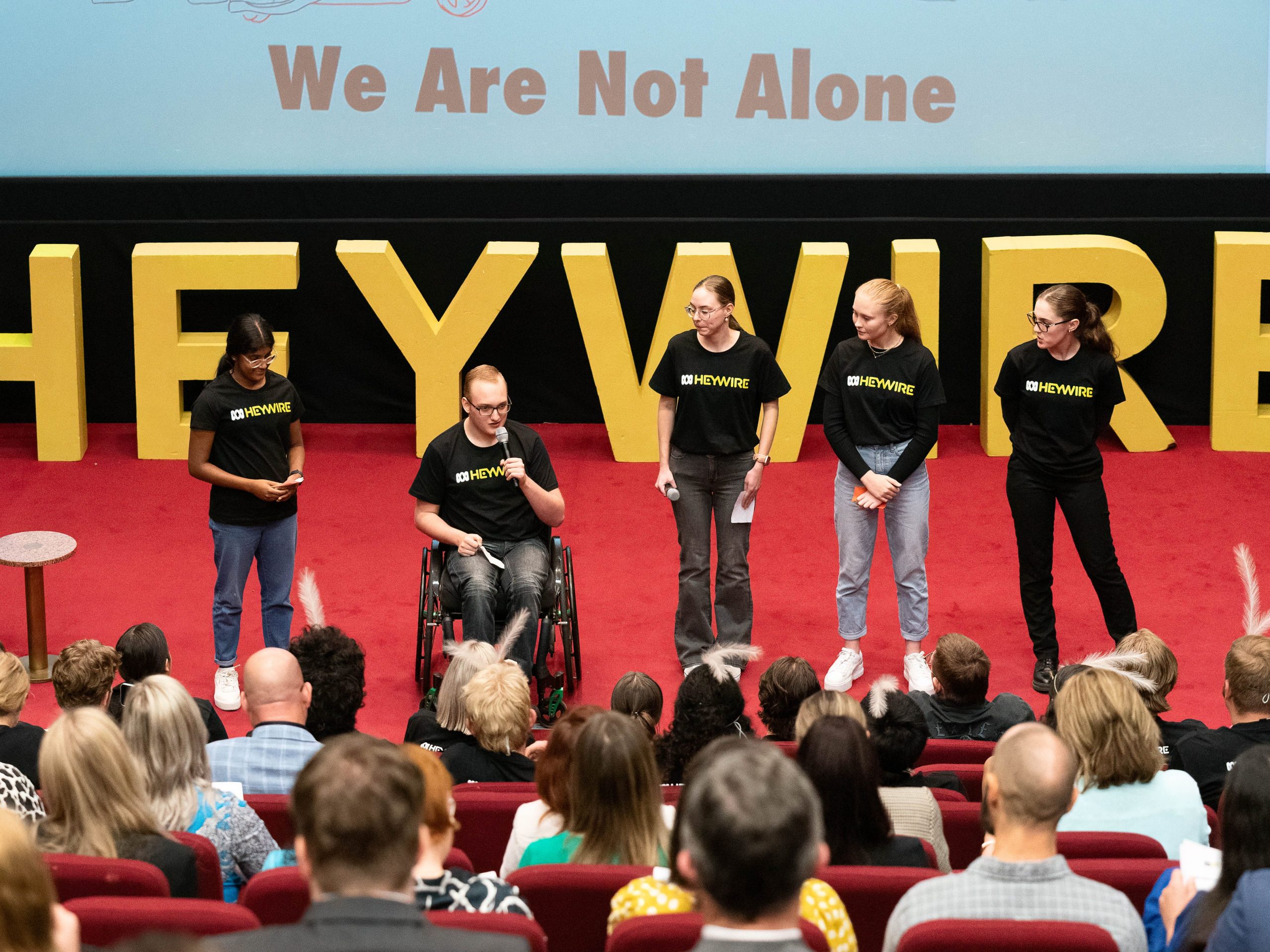
Photo credit: Bradley Cummings
For rural, regional and remote communities, harnessing the energy and social consciousness of young people represents an incredible opportunity – and unique challenges – to do things differently when it comes to local community leadership and volunteerism. The work we do at FRRR supports so many volunteer-run groups providing critical services across these communities that may not otherwise exist. As the Government funded work unfolds to inspire future volunteers, developing a targeted strategy for engaging young people living in rural, regional and remote contexts will be so important to ensure the viability of these essential volunteer-run resources.
My work at FRRR provides an up-close view of the hopes, dreams and frustrations of young people living in rural, regional and remote Australia, through our partnership with the ABC Heywire, Takeover and Trailblazer programs. Young people who care deeply about fairness, diversity and equity, who are keenly aware that they will be emerging into adulthood in a world suffering the impacts of climate change, and who have grown up with technology and access to instant information at their fingertips. Young people who have lived their formative years impacted by a series of traumatic events – bushfires, drought, floods and a global pandemic – missing much anticipated milestones and often feeling unsure about what opportunities might still be open to them in the future. Young people who want to make sure the voices of diverse and marginalised people are heard, and who value flexibility and investing in wellbeing. Young people who, when given the opportunity and voice, are a source of innovative and practical solutions to some of the biggest challenges Australia’s rural, regional and remote communities are facing.
What I’m also seeing in our place-based capacity building programs, like Investing in Rural Community Futures (IRCF), is that the volunteers who have been the backbone of small community organisations for decades are now looking to retire and pass the baton. They are exhausted because so much of the recovery work, from the series of disasters in recent years, has fallen on their shoulders. They know the answer lies in engaging young people as the next generation of leaders but are often not quite sure how. We also see that young people want to connect and help, but they struggle to see themselves in the same roles their parents and grandparents have held, doing things the way they have always been done.
Instead of inviting regional young people to take a seat at the existing community leadership table, what if we first co-design a new ‘table’ with them? To hear and really listen to the ways they are inspired to connect. I couldn’t agree more that taking on a volunteer role can be empowering and career building for young people, but first we need to make sure we get the ecosystem right.
Could some volunteer opportunities be done remotely or more flexibly? Could a broader model of shared leadership be adopted? Could some traditional volunteer roles become paid or partially paid roles, so that young people without the means to donate their time, can still be involved in their community in meaningful ways and become inspired for a lifetime of connection to the sector? And definitely not to be left out – how can we make sure there’s a healthy dose of fun in volunteering?
There is sometimes an assumption made that because they are not showing up in familiar ways, young people don’t want to show up for community. What I see and hear is the exact opposite. Young people in regional communities are looking at complex problems, with fresh eyes, and coming up with entrepreneurial solutions. Like the volunteer Youth Leadership Committee at Heywire grantee Human Nature, who shaped their alumni program with the flexibility for young people to participate in activities that interest them and suit their personal life goals. And like the Regional Education Support Network (RESN), a youth volunteer-led organisation that has connected 1,400 school students with over 400 online peer tutoring volunteers across regional NSW and Victoria.
As young people imagine their futures, wouldn’t it be great if they had a career with a social impact focus on their radars as an exciting and viable one? To see staying in their rural, regional or remote community as a first choice to do work that aligns with their values, and not one that comes with a long list of compromises.
It brings me so much joy in my work at FRRR to know that we are committed to deeper engagement with regional young people. We are adding meaningful opportunities for their powerful voices to be present and truly heard in decision making that values their knowledge and reflects their values. This year, with generous donor support, we are embedding paid youth advisor roles to work alongside NFP’s implementing youth-designed projects funded through the Takeover Mildura program. We have also shifted a volunteer ABC Heywire Youth Internship role to a paid position, along with offering an honorarium for our Youth Advisory Panel who assess grant applications. This will ensure that all eligible young people have the opportunity to take a leadership role in deciding what projects best meet the needs of young people.
We never want to lose the opportunities for unpaid volunteering. However, when we are asking young people to share their expertise and lived experience, we need to make sure those unique skills are valued. Re-imagining how small volunteer-centred NFPs in remote, rural and regional communities might survive and continue to operate as vital community resources and services in the future is no small challenge. The answer lies with the young people who will both lead and need these programs and services. They are the solution, so let’s take every opportunity to listen and learn.

